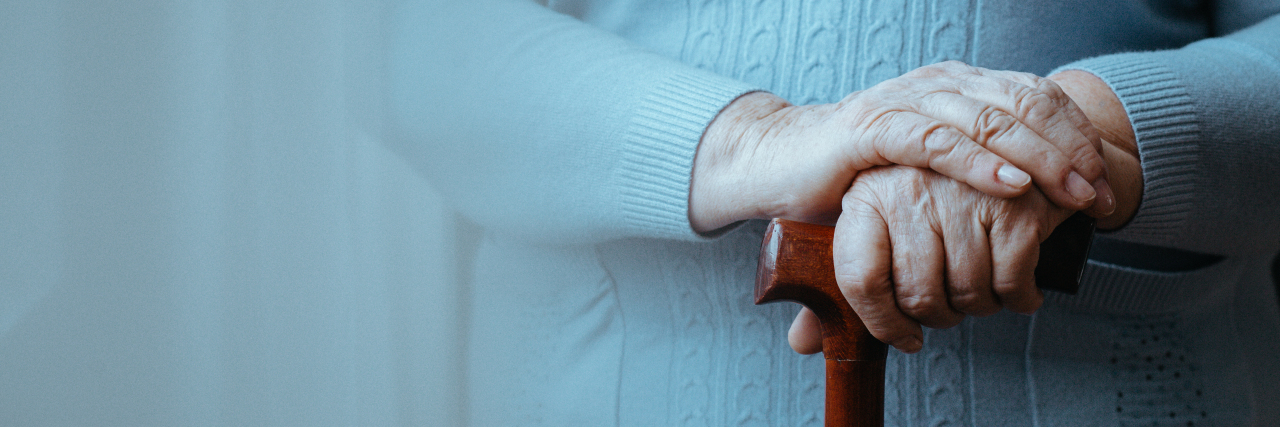A decade ago, when I first became disabled, I was fixated on recovery and rehabilitation. The doctors didn’t understand Bickerstaff brainstem encephalitis very well, but they knew it is a rare variant of the already-rare Guillain Barré syndrome, and they told me many patients fully recover from GBS. So, over the course of about three years, I worked hard every day in physiotherapy, underwent multiple surgeries, procedures, and injections, moved from hospital, to rehab, to a care facility, to a group home, and finally to Independent Living in a Family Care Home. I have come a long way from the ICU, when I woke from a coma and discovered I was paralyzed, visually impaired, unable to speak, with pointer-flexed feet, a contractured hand, and in unbearable pain and discomfort. However, I did not, and will never, fully recover.
I am ambulatory after tendon-release surgery in my ankles, but I use an electric wheelchair for various reasons. After multiple surgeries, my right hand is usable but not fully, and most of my joints are contractured. It took a long time for me to accept that I have plateaued in my rehab and am not likely to recover further. After learning to adapt to my own and society’s limitations, spending time advocating for myself and others with disabilities, and finding fulfillment in my life with a disability, I’m OK with it now. I’ve come to realize that living life on life’s terms is much more productive and fulfilling than living life on the terms I wish I had.
I am coming up on 50 years on this planet, now middle-aged and menopausal, and my mind is becoming obsessed with something new: becoming elderly. I know it will be years before I will actually be elderly, but I have been feeling small changes happening over the last couple of years. You know what I’m talking about: My body complains a little more about getting out of bed in the morning. My knees whine more when I haul myself to my feet. I squint and move the print further away so I can read. I make far more grunting and puffing noises during physical exertion. I recover from injury and illness more slowly.
Everyone eventually experiences the aging process, but for me and many others with disabilities, all of this is heightened. When you’re already living with chronic pain, limited mobility and lack of independence, these changes can seem more intense, more worrisome. For people with chronic illness and degenerative diseases, aging can be downright terrifying.
After all the experiences I’ve had throughout my life, there is nothing I fear anymore, not even death — except becoming dependent again. I spent many years in a state of perpetual dependence, feeling isolated, lonely, confined, and limited in experiences. I hated it, every minute of it! As a fiercely independent woman, I couldn’t stand being dependent on others for all my needs. I couldn’t stand being treated like an “invalid,” like someone whose mind is as non-functional as their body. The mere thought of returning to that state sends a bolt of fear through my belly. And all the recent horror stories about nursing homes and care facilities only reinforces that fear because, while I was in that state, I also suffered cruelties and abuses. The most frustrating and demoralizing thing about it was that I had no power to fight against it, and no voice to speak out with.
I’m not saying that becoming dependent or needing full-time care is the worst thing that could happen to a person, and I’m not saying it’s not possible to enjoy a good quality of life while requiring that level of care. I’m saying that it frightens me. It frightens me because I’ve experienced it, and I don’t want to experience it again. It frightens me because I don’t want to lose my independence and autonomy. It frightens me because our society and its medical professionals are not educated, trained, and prepared enough for the impending growth of the elderly population in the decades to come.
It seems that every day I read about yet another vulnerable and dependent individual dying from neglect, suffering abuse, or languishing in a care facility somewhere. If the system doesn’t change, these stories are going to become a regular occurrence, and fear of aging will become a very real thing for many more people besides myself. Our species continues to live longer and longer lives. Many medical advances have been made that will improve the health of the elderly, and accessibility for and inclusion of the disabled community is slowly improving as we evolve. But we have a long way to go in terms of providing a good quality of life to those who require full-time care, those whose cognitive functions are deteriorating, those who no longer have a voice.
I’m not afraid of dying. I’m afraid of not living well. I want to know I will be well taken care of if I’m no longer capable of doing it myself. I want to know that I will be treated with dignity and respect despite my failing body/mind. I want to know that I’ll be safe from cruelty and abuse if I can’t speak up for myself. Doesn’t everyone, though? This is not just an issue for the elderly and people with disabilities. It affects everyone of all ages, races, genders etc. Most of us will grow old and will need some form of assistance in our lives. Some of us will get sick, some will become disabled, some will need full-time care, some will live in care facilities. Wouldn’t you like the reassurance that whatever your golden years entail, you will live them in comfort and dignity?
Getty image by KatarzynaBialasiewicz.

